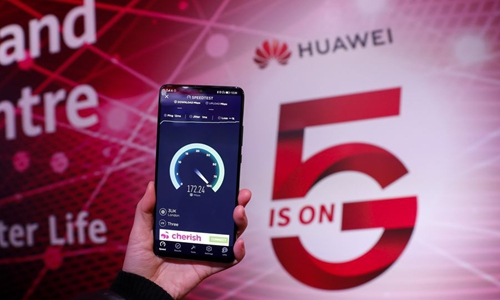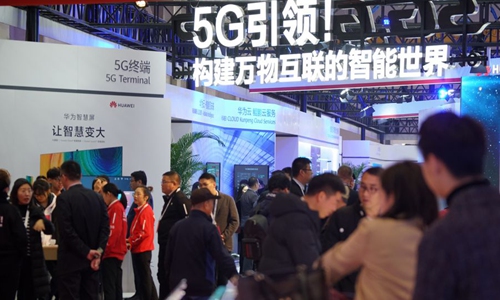China on Wednesday harshly criticized the UK's decision to ban Huawei from the UK's 5G development, painting London as an accomplice in the US' politically driven crackdown on the Chinese telecom giant based on fabricated "national security risks," and vowed to take "all necessary" measures to protect the legitimate interests and rights of Chinese businesses.

A staff member tests the speed with a Huawei 5G mobile phone at Huawei 5G Innovation and Experience Center in London, Britain, on Jan. 28, 2020. (Photo: Xinhua)
While Chinese officials did not announce specific countermeasures, the deep indignation China displayed toward the UK's move foreshadows a rather tumultuous period in China-UK ties with profound geopolitical, diplomatic and economic implications, Chinese analysts said. With the ban, the UK essentially took its gloves off and set off a potential showdown with China over not just technology but also Hong Kong, putting its businesses in China and broader trade and investment cooperation with its second-largest non-EU trade partner at risk, analysts added.
The fierce pushback from officials in Beijing on Wednesday were also accompanied by defiance at Huawei, which hinted that it was preparing for a "war" in a social media post from its prolific founder Ren Zhengfei following the UK ban. Still, the firm might have to face heavy losses in the UK and be forced to change its overseas strategy, including layoffs and closures, as more Western countries might follow in the UK's steps, insiders noted.
Profound implications
Relenting to pressure from the US and anti-China politicians in the UK, the UK government on Tuesday reversed an earlier decision to allow limited participation by Huawei in its 5G development and banned UK carriers from buying 5G equipment from Huawei after December 2020. It also decided to replace Huawei's equipment already in use by 2027.
Highlighting the highly politicized nature of the decision, the UK's move was celebrated with a victory lap by US President Donald Trump, who claimed he personally convinced many countries including the UK to ban Huawei equipment, while in Beijing, a spokesperson for the Chinese Foreign Ministry called the move a threat to Chinese investments in the UK and vowed that China will take "all necessary" countermeasures.
"China has serious concerns about this, will fully and rigorously assess this event and take all necessary measures to safeguard the legitimate rights and interests of Chinese companies," Hua Chunying, the Foreign Ministry spokesperson, told a routine press conference on Wednesday.
Hua did not elaborate on the potential measures, but noted that the UK's move has undermined mutual trust for China-UK cooperation and China's confidence in the UK market. "This is not about one company or one industrial sector, this is about the UK highly politicizing commercial and technology issues at all costs," she said.
Even without tit-for-tat retaliation from China, the UK, which is already facing tremendous uncertainty for its post-Brexit outlook, will feel the pain on multiple fronts, Chinese analysts said. Even the UK's Digital Secretary Oliver Dowden, who announced the ban, admitted that the ban could delay UK's full 5G deployment by up to three years and add 2 billion pounds ($2.52 billion) in extra costs.
And those could just be the beginning of the economic fallout of the UK's ban on Huawei, Chinese analysts noted. They suggested that China take similar moves against UK businesses that rely heavily on the Chinese market such as London-based bank HSBC, which has already drawn widespread anger in China over its involvement in the US crackdown on Huawei.
"If the UK insists on politicizing the business operations of a single Chinese firm, China could also do the same to defend the rights of Chinese firms," Zhao Junjie, a research fellow with the Chinese Academy of Social Sciences' Institute of European Studies, told the Global Times on Wednesday, noting that UK firms' "political bow" to the US should make UK companies that make big profits in China like HSBC to "get nervous and suffer."
There are other measures regarding trade that China could also take in retaliation to the UK over not just the Huawei ban but also its gross interference in China's internal affairs in Hong Kong, analysts said.
"Chinese officials are expected to issue corresponding economic and trade measures between China and the UK," Wei Jianguo, a former Chinese vice minister of commerce, told the Global Times on Wednesday, noting that prospects for a potential China-UK trade agreement post-Brexit has been "clouded" by the move. "The Huawei ban will exert huge impacts upon UK exporters and importers," Wei remarked.
If the Huawei ban prompted a wider trade conflict between China and the UK, the UK's trade could fall by 90 percent in the worst case scenario, its GDP could drop by 0.75 percent and inflation could rise by 0.6 percent in 2020, the UK's National Institute of Economic and Social Research (NIESR) said in a report on Monday.
In 2018, China was the UK's second-largest trading partner after the US, with two-way trade reaching 68.3 billion pounds, according to UK official data released in February. Apart from trade, there is massive Chinese investment in the UK, including major stakes in a 20 billion pound nuclear power project in Hinkley Point C. Chinese students also contribute at least 1.7 billion pounds a year to UK universities, according to the NIESR.

Visitors look at the 5G intelligent system exhibition booth of China's Huawei at the 2019 World 5G Convention in Beijing, capital of China, Nov. 21, 2019. (Photo: Xinhua)
Huawei's defiance
But in immediate terms, the UK is at risk of losing thousands of jobs and billions of dollars in investment by Huawei, as the company might have to adjust its strategy in overseas markets, and potentially its staff in those markets, especially in the UK, would return to China in the near future, a Huawei insider told the Global Times on Wednesday.
Huawei said it supported over 26,200 jobs in the UK in 2018 and contributed 470 million pounds in tax revenue to the UK. Huawei has just been approved to build a 1 billion pound research centre in the UK.
It was unclear whether the latest ban on Huawei will affect those jobs and investments. The company said in a statement it sent to the Global Times that it will conduct a detailed review of what the UK ban means for its business in the country.
However, any adjustments in the UK and other overseas markets also mean huge losses for the Chinese company. For instance, the potential withdrawal of staff from the UK could result in a 10 percent downsizing of the company's current headcount in the domestic market, according to the insider, who spoke on the condition of anonymity.
Some analysts have also warned that following the UK's decision on Tuesday, more Western countries such as Canada could also take restrictive measures on the Chinese company under intensifying pressure from the US, though others also noted that it was unlikely for countries outside of the "Five Eye" alliances to blindly follow the US, given the potential damages. Germany and Belgium have reportedly said that they would not follow in the UK's steps.
Despite the tremendous uncertainty and risks, Huawei, which reported a 13 percent revenue growth despite mounting challenges in the first half of 2020, stroke a defiant message on Wednesday, though in an implicit manner.
On a social media platform shared by its workers, the company pinned a post of what has been called a "speech of war mobilization" by Ren in July 2019 . In the speech, Ren repeatedly stressed that the company must "change" to maintain a position of "war."
"Upward, we will reach beyond the sky; downward, we will root deep into the Earth," he said.


